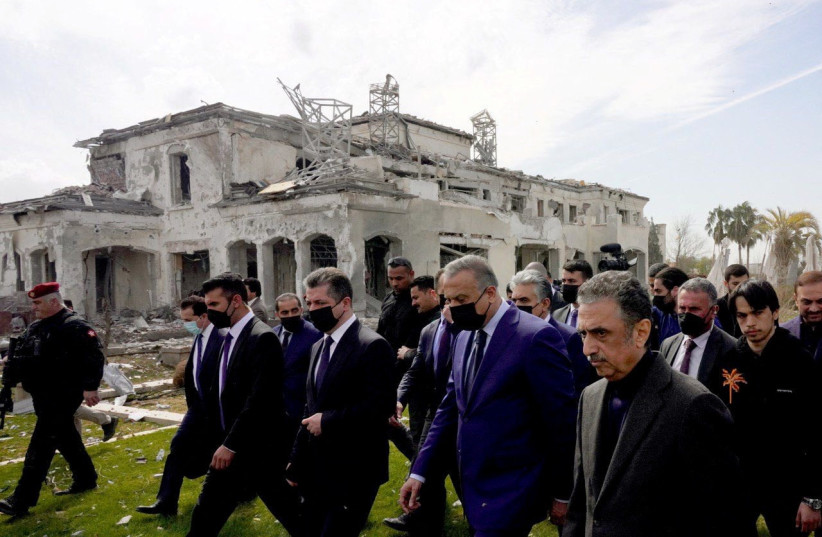Iraqi lawmakers failed again on Saturday to elect a new president, making it appear that Iraq is now in a “quagmire” according to Al-Ain media in the Gulf.
Other reports have said that Iraq is now “mired in political paralysis,” due to the fact that the country is deeply divided between the pro-Iranian factions that seek to hold the country hostage and other groups that make up the parliament. Iraq has powerful Kurdish parties, as well as parties that are rooted in the Sunni Arab minority.
Since the US invasion of Iraq and the toppling of the dictator Saddam Hussein, Iraq has had a Kurdish President.
Some of these presidents have come from the Kurdish PUK party, and the current President Barham Salih is a Kurdish academic and former politician.
Since the end of the war on ISIS, Iraq has lurched from one crisis to another. In 2019 it saw massive protests and pro-Iranian militias slaughtered protesters. Since then, Iraq has also had chaos at the Prime Ministerial level, where Mustafa Al-Kadhimi is currently filling the position of Prime Minister.

According to reports, the parliament had agreed to a list of 40 candidates for the presidency, which is a largely ceremonial role.
“The contest pits Barham Saleh, the incumbent and member of the Patriotic Union of Kurdistan, against Rebar Ahmed of the Kurdistan Democratic Party (KDP), the PUK's rival,” noted France 24.
However, only 202 lawmakers showed up for the vote which meant there was a lack of quorum, which could make it seem that Iraq’s parliamentarians don’t take this seriously, but this actually comes after a ruling on February 13 that barred an important politician, Hoshyar Zebari, from running. He is a member of the Kurdish KDP party, the largest party in the autonomous Kurdish region.
Iran has recently targeted the Kurdish region with ballistic missiles which targeted an area near a new US consulate that is being built. However, Iran claimed it was also targeting a “Mossad facility.”
Iran is seeking to force the US to leave the Kurdish region. According to reports, the Kurds had secured the support of Moqtada al-Sadr, a nationalist Shi’ite religious leader. But Sadr has often said one thing and not carried it through. Previous efforts to secure a president for the country failed in February.
Once again the problem in Iraq pits the pro-Iran members of parliament, linked to the Fatah Alliance and the Hashd al-Shaabi militias, against the Kurds, Sadr and Sunnis. It may not be so simple, because there are a number of parties and factions in Iraq, but in essence, this is the main problem facing a divided Iraq.
Iraq’s problem in finding a president is merely part of its larger problems and the way the country is becoming host to a factional divide that reflects larger divides in the region.
The Gulf states, for instance, want to invest in Iraq and back the Kurdish region. Iran wants to hijack Iraq and use it to move weapons to Syria and Lebanon, as well as to develop the Hashd (also called the PMU), as a kind of Hezbollah in Iraq.
For instance, pro-Iran groups have not only targeted Erbil in the Kurdish region with armed drones, they have also targeted Saudi Arabia and the UAE from Iraq, as well as targeting Israel.
Iran wants to use Iraq as a launchpad for attacks on countries in the region. Meanwhile, the UAE has recently hosted Syrian regime leader Assad and would like to continue to bring Syria back into the Arab League and use Iraq as a center of gravity, to pivot it back to the Arab world. That role for Iraq, as a powerful Arab state, was what motivated Saddam Hussein. This possibility concerns Iran, as they want Iraq to be poor and weak, used as a kind of “near abroad.” Iran is willing to do to Iraq what Russia is doing to Ukraine, in this context. That means Iran wants a weak and compliant leader in the president’s office of Iraq. The divisions were discussed at Al Ain media this week in the UAE.
“Once again, the Iraqi parliament fails to pass the personality of the new president of the republic between the hammer of a quorum and the anvil of consensus between the political forces,” the report said.
The report said that some members of parliament had boycotted the session. “Parliament Speaker Muhammad al-Halbousi moderated the voting session before deciding to raise it to next Wednesday due to the lack of a quorum after the number of attendees did not exceed 203 deputies.”
The current president said in a statement: "The political forces today are facing a decisive national test, and that the difficult circumstances that the country has gone through and the current delicate circumstance impose on everyone a historical responsibility and an exceptional work to get out of the current crisis in the spirit of patriotism and solidarity."
Al-Ain noted that “despite the limited powers of the President of the Republic to withdraw the Iraqi constitution, the conflict is most intense between the two sides of the political scene, as he is required to assign the candidate of the largest bloc to form the government within a period of 15 days after his election.” This means that the pro-Iran factions want to capture the presidency so they can choose their candidate for Prime Minister.
The report says that what happens next is unpredictable. Regarding the expected scenario in the coming days, political analyst Ali al-Katib told Al-Ain, "the Iraqi constitution has put in place legislation and the Federal Court has recently strengthened it by strengthening quotas and consensus at the expense of the true essence of democratic systems." Now more months ahead may see a lack of a presidential choice and continued chaos in Iraq. This is what Iran wants and it is why the chaos continues.
